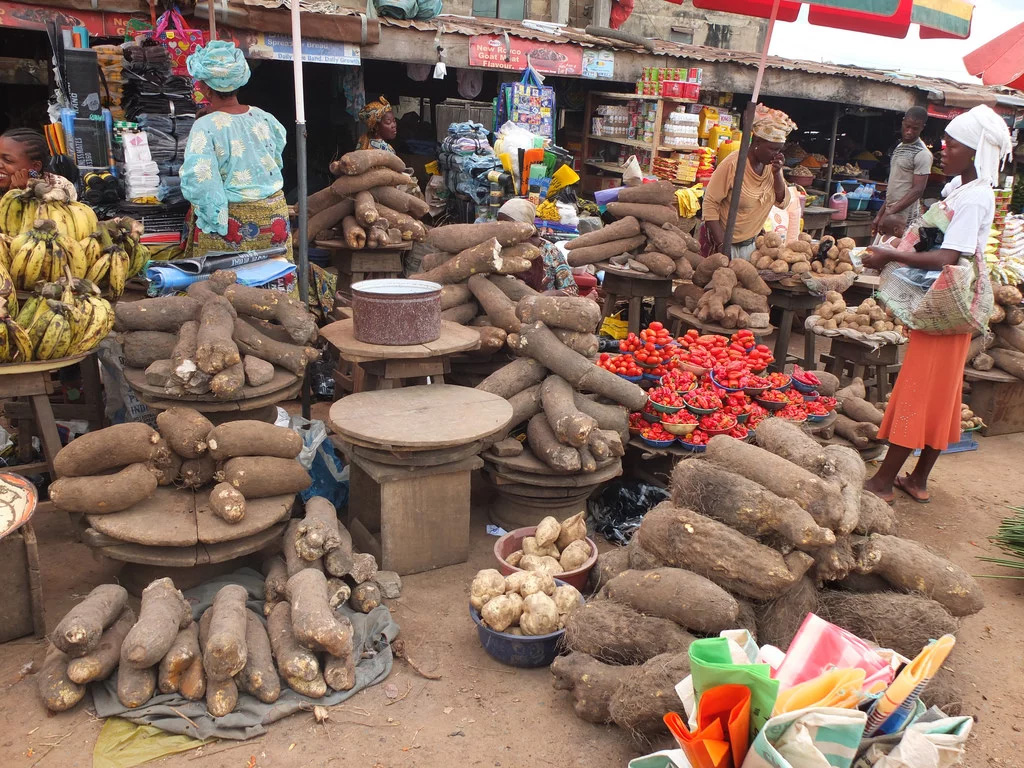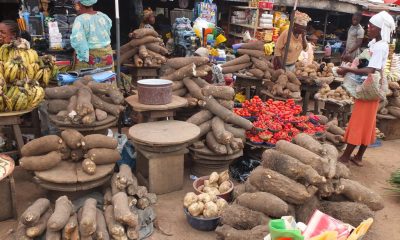Business
Agric budgets hit N874.83bn, food imports gulp N7.81tn

The Federal Government budgeted about N874.83bn for the Federal Ministry of Agriculture and Rural Development from 2016 to 2021, whereas the imports of agricultural goods into Nigeria during same period were estimated at N7.81tn, checks by our correspondent showed.
It was gathered that the highest imports of agricultural goods into the country during the period under review were recorded in 2021, as products valued at N2.74tn were imported last year.
On the other hand, the least imports within the same duration were reported in 2016. Nigeria’s agricultural goods imports in 2016 were estimated at N656.4bn.
Operators in the agric business space frowned at the development, outlining a plethora of reasons for the massive imports when compared to what was budgeted and often not fully released to the agric ministry during the review period.
Data from the 2016 to 2021 budgets for the ministry indicated that the government budgeted about N874.83bn for the ministry to drive the country’s agricultural sector during the six-year period.
Whereas data analysed by our correspondent from 24 different quarterly reports obtained from the National Bureau of Statistics on ‘Foreign Trade in Goods Statistics’ with respect to the total imports of agricultural goods into Nigeria showed that N7.81tn was spent on food imports.
READ ALSO:
- US announces $1bn in new military aid for Ukraine in largest delivery of arms yet
- Obi won’t win half of any Nasarawa council – Adeyanju
- Kwara teenager disguises as mad man, rapes 10-year-old
An analysis of the budgets for the agriculture ministry showed that in 2016, the ministry got a budget of N46.17bn for capital projects and N29.63bn for recurrent expenditures, making it a total of N75.8bn for that year.
Its budget for capital projects in 2017 was N103.79bn, while both the combined capital (N118.98bn) and recurrent (N53.81bn) budgets for the ministry in 2018 was N172.79bn.
In 2019, the FMARD’s capital and recurrent budgets were N107.21bn and N57.68bn respectively, translating into a total of N164.89bn.
Its 2020 capital budget was N124.4bn with a recurrent budget of N58.69bn, making it a total of N183.1bn.
The ministry’s 2021 capital budget was N110.24bn. It got N69.22bn for recurrent expenses, bringing its total budget for last year to N174.46bn.
Meanwhile data from the Foreign Trade in Goods Statistics of the NBS on total imports of agricultural goods imported into the country last year was N2.74tn.
Figures from the bureau’s quarterly reports showed that in the fourth, third, second and first quarters of 2021, the agricultural goods imports were N667.16bn, N789.1bn, N652.08bn and N630.2bn respectively.
Food or agricultural imports in 2020 gulped N1.713tn, as the country spent N532.4bn, N503.4bn, N415.6bn and N261.4bn importing agricultural goods in Q4, Q3, Q2 and Q1 respectively in 2022.
A total of N959.48bn was spent on agro-commodities’ imports in 2019, with N233.3bn spent in Q4, N239.9bn in Q3, N249.95bn in Q2 and N236.33bn in Q1.
For 2018, agricultural goods imports consumed N851.7bn. The amounts spent on imports in the fourth, third, second and first quarters were N218.8bn, N224.3bn, N224.5bn and N184.4bn respectively.
The NBS put the total amount of agricultural goods imported into Nigeria in 2017 at N886.7bn. It stated this in its fourth quarter report for 2017.
The Q4 2017 report also revealed the total amount of agricultural goods that were imported into the country in the preceding year of 2016 was put at N656.4bn.
It was observed in the various quarterly reports that the major agricultural goods imported into Nigeria included Durum wheat, crude palm oil, palm olein, among others.
Operators in the sector decried the huge imports of agricultural products into Nigeria, attributing this to the myriad of challenges in the sector.
The National President, All Farmers Association of Nigeria, Kabir Ibrahim, told our correspondent that the drop in exports and huge imports were due to reduced productivity in Nigeria.
He said the lack of agro-inputs and insecurity were also major constraints confronting industry and its operators in Nigeria.
He said, “Our productivity has gone down now, which means that the quantity available to export has gone down and as such we have to rely on imports to meet local demand. This is worrisome to not just farmers but to every genuine stakeholder in the agricultural industry in this country.”
Punch
Business
Finally, NERC unbundles TCN, creates new system operator

Finally, NERC unbundles TCN, creates new system operator
The Nigerian Electricity Regulatory Commission (NERC) has set up the Nigerian Independent System Operator of Nigeria Limited (NISO) as it unbundles the Transmission Company of Nigeria (TCN).
The transmission leg of the power sector has over the years been seen as weakest link with obsolete equipment.
The unbundling announcement is contained in an Order dated April 30, 2023 and jointly signed by NERC chairman, Sanusi Garba, and vice chairman, Musiliu Oseni.
By this order, the TCN is expected to transfer all market and system operation functions to the new company.
The commission had previously issued transmission service provider (TSP) and system operations (SO) licences to the TCN, in accordance with the Electric Power Sector Reform Act.
The Electricity Act 2023, which came into effect on June 9, provided clearer guidelines for the incorporation and licensing of the independent system operator (ISO), as well as the transfer of assets and liabilities of TCN’s portion of the ISO.
In the circular, the commission ordered the Bureau of Public Enterprises (BPE) to incorporate, unfailingly on May 31, a private company limited by shares under the Companies and Allied Matters Act (CAMA), 2020.
NERC said the company is expected “to carry out the market and system operation functions stipulated in the Electricity Act and the terms and conditions of the system operation licence issued to the TCN.
“The name of the company shall, subject to availability at Corporate Affairs Commission, be the Nigerian Independent System Operator of Nigeria Limited (“NISO”),” NERC said.
Citing the object clause of the NISO’s memorandum of association (MOU) as provided in the Electricity Act, NERC said the company would “hold and manage all assets and liabilities pertaining to market and system operation on behalf of market participants and consumer groups or such stakeholders as the Commission may specify.”
Business
Naira depreciates again, trades at N1,402/$

Naira depreciates again, trades at N1,402/$
The Nigerian currency, naira, on Thursday slightly depreciated at the official market, trading at N1,402.67 to the dollar.
Data from the official trading platform of the FMDQ Exchange, a platform that oversees the Nigerian Autonomous Foreign Exchange Market (NAFEM), showed that the naira lost N11.71
READ ALSO:
- Why I killed my one-year-old son – Delta woman
- Bandits kill nine civilian JTF members, kidnap three in Sokoto
- Yahaya Bello govt spending third term in office through Ododo – Clark
This represents a 0.84 per cent loss when compared to the previous trading date on Tuesday April 30, when it exchanged at 1,390.96 to a dollar.
However, the total daily turnover increased to 232.84 million dollars on Thursday, up from 225.36 million dollars recorded on Tuesday.
Meanwhile, at the Investor’s and Exporter’s (I&E) window, the naira traded between 1,445.00 and N1,299.42 against the dollar.
Naira depreciates again, trades at N1,402/$
Auto
Appeal court takes over NURTW case as NIC withdraws

Appeal court takes over NURTW case as NIC withdraws
The National Industrial Court has withdrawn from a case involving Alhaji Najeem Usman Yasin, Board of Trustees chairman of the National Union of Road Transport Workers (NURTW), and Alhaji Tajudeen Ibikunle Baruwa’s ambition to return as president of the union over lack of jurisdiction.
The industrial court’s decision was made to avoid conflict with the Court of Appeal, where the matter is already being heard.
Before the NIC announced its decision to hands-off the case, the defendants’ counsel, Mr. O.I. Olorundare SAN, had informed the court that the matter is currently before the Court of Appeal, Abuja division, and that the industrial court could not continue to adjudicate on the same matter.
The counsel cited authorities to support his claim, adding that the National Industrial Court does not have concurrent jurisdiction with the Court of Appeal.
The presiding judge, O.O. Oyewunmi, struck out the case, stating that the Appeal Court had taken over the matter and that the Industrial Court must respect the hierarchy of courts.
Alhaji Yasin and six others took the case to the Appeal Court, challenging the decision of the industrial court recognising a delegates’ conference held on May 24, 2023, where Baruwa was proclaimed as President of the union for a second term in office.
With the latest NIC judgement, both parties will now proceed to defend their positions at the Court of Appeal and await the final judgement.
-

 News3 days ago
News3 days agoLabour-FG face-off imminent as NLC rejects new salary increase
-

 Auto3 days ago
Auto3 days agoAppeal court takes over NURTW case as NIC withdraws
-

 metro3 days ago
metro3 days agoTerrorists release video of kidnapped palace servant, others in Zamfara
-

 Africa3 days ago
Africa3 days agoMan who has lived in America for over 13 years says he’s tired, wants to return home
-

 metro2 days ago
metro2 days agoSecurity forces, vigilantes arrest kidnapper terrorising communities in Kogi
-

 metro3 days ago
metro3 days agoInspector arrested with snatched car
-

 News2 days ago
News2 days agoDrama as Delta workers boo Gov Oborevwori over minimum wage
-

 metro2 days ago
metro2 days ago19-year-old boy convicted for impregnating 14-year-old sister






















